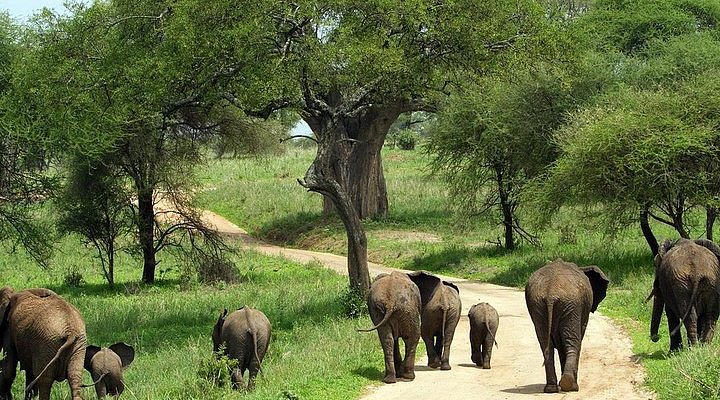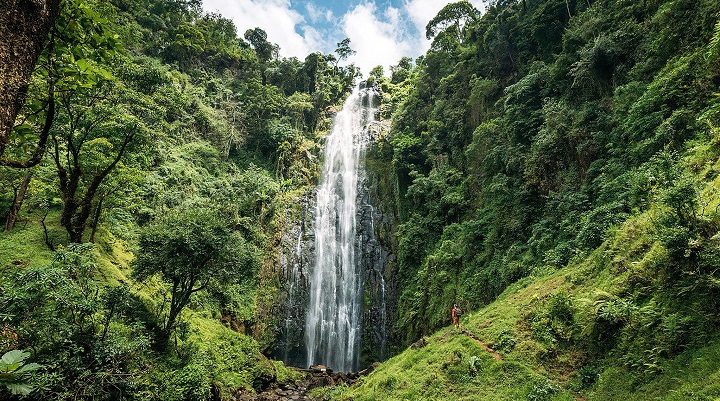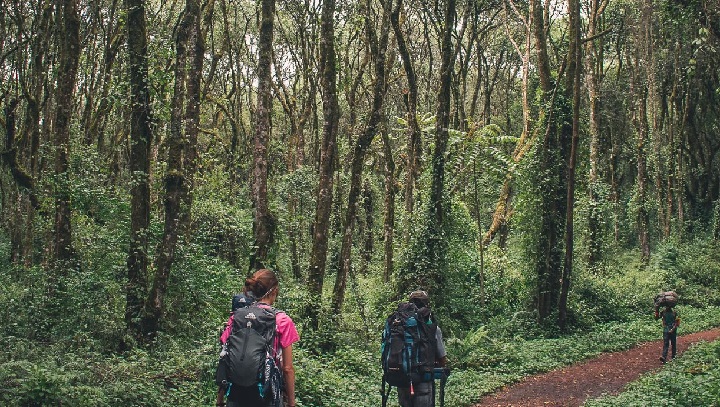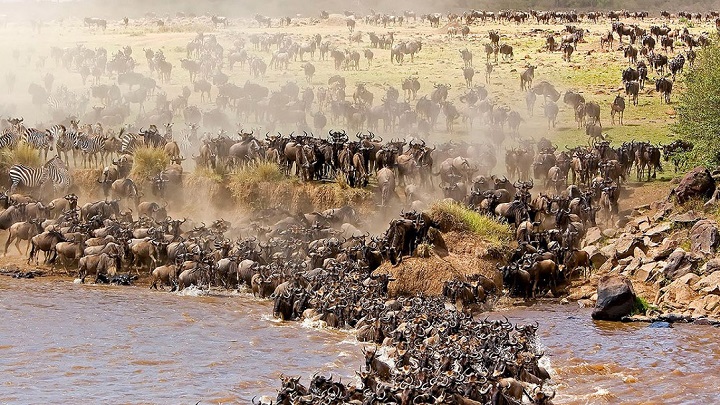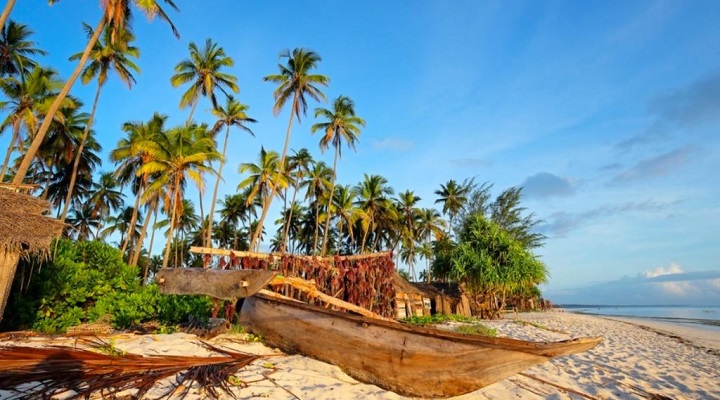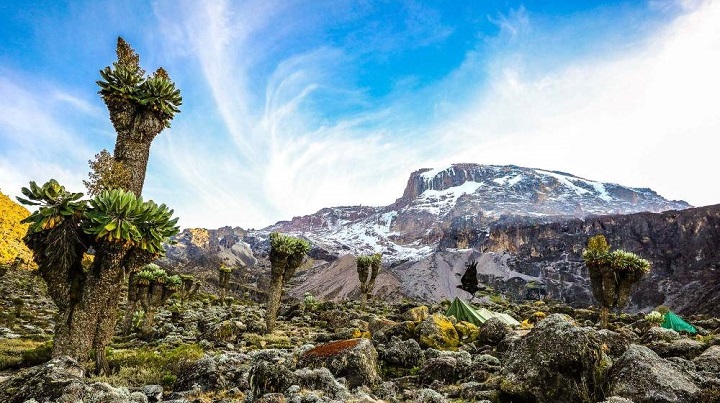
10-Day Tanzania Adventure: Machame Route & Wildlife Safari
Embark on the ultimate Tanzanian journey combining the thrill of summiting Africa’s highest peak with the awe of world-class wildlife encounters.
Your adventure begins with the 6-Day Machame Route, Kilimanjaro’s most scenic and popular trail. Known as the “Whiskey Route,” Machame offers breathtaking landscapes that change with each day—lush rainforest, moorland, alpine desert, and the spectacular glaciers of the summit. This route provides ample time for acclimatization, increasing your chances of reaching Uhuru Peak, the Roof of Africa. Nights are spent in comfortable tents beneath a dazzling canopy of stars.
After conquering Kilimanjaro, the journey continues with a 4-Day Wildlife Safari through Tanzania’s iconic national parks. Explore Lake Manyara, famous for its flamingo-filled shores and diverse wildlife. Witness the vast plains and incredible migrations of the Serengeti, home to the Big Five and countless other species. Conclude your safari in the Ngorongoro Crater, a UNESCO World Heritage Site teeming with wildlife in a dramatic natural amphitheater.
This 10-day adventure is perfect for those seeking both high-altitude achievement and unforgettable wildlife experiences, offering the very best of Tanzania in one remarkable journey.
Day 0 : Pickup to Airport
Day 1: Machame Gate (1,800m/5,905ft) to Machame Camp (3,000m/9,840ft)
Your first day’s destination is Machame Camp. Each day, porters and cooks will walk ahead to set up the camp in time for your arrival. On the first day, hike through the moss-covered trees of Kilimanjaro’s cloud forest. The forest will thin at the end of the hike and vegetation will change to include heathers, tall grasses and wildflowers. If the weather is clear, view the surrounding area and your ultimate destination, Kibo Peak.
Day 2: Machame Camp (3,000m/9,840ft) to Shira 2 Camp (3,840m/12,600ft)
As you gain altitude, notice the change in vegetation. The trees diminish in size, giving way to Kilimanjaro’s famous high altitude plants, Scenario Kilimanjaro and Lobelia decennia. After eating lunch, climb the Shira Plateau, created when Kibo’s lava flows filled the Shira crater. Continue to Shira Camp, where you will relax for the rest of the day. Kibo lies to the west and Mount Meru to the east.
Day 3: Shira 2 Camp (3,840m/12,600ft) to Barranco Camp (3,950m/12,960ft)
After breakfast, hike east on the Shira Plateau before reaching the junction for the Shira and Lemosho Routes. Continue on through the barren landscape before stopping for lunch. Shortly after lunch, reach the highest point of the day before descending quickly to Barranco Camp. Faster hikers can take a detour via Lava Tower, a 300-foot lava formation jutting out of the mountainside.
Barranco Camp, set among stands of Senseco Kilimanjaro, is considered to be the most scenic campsite on the Machame Route.
Day 4: Barranco Camp (3,950m/12,960ft) to Barafu Camp (4,600m/15,100ft)
During day four, hike by the Heim, Kersten and Dicken Glaciers. Although the way to Barafu is bleak, alpine desert with little vegetation, Barafu Camp offers stunning views of Kibo and Mawenzi peaks, and Rebmann Glacier. Try to sleep as soon as you finish dinner as you will be waking up at midnight for your summit hike.
controls="collapseFive"> Day 5: Barafu Camp (4,600m/15,100ft) to Uhuru Peak (5,895m/19,340ft) to Mweka Camp (3,100m/10,170ft)
The hike from Stella Point to Uhuru Peak is a gradual climb and, as far as hikes go, not very difficult. The altitude, however, makes the hike long and tiring. The crater rim hike takes approximately one hour. Upon reaching Uhuru, take photos of your guide and group at the peak before beginning the descent to Mweka Camp. On the way down from Uhuru, enjoy views of the mountain, crater, clouds and glaciers.
At Barafu Camp, eat breakfast and take a short break. You still have another three to five hours to go before reaching Mweka Camp.
Day 6: Mweka Camp (3,100m/10,170ft) to Mweka Gate (1,500m/4,920ft)
Day 7: Moshi/Arusha Town To Lake Manyara National Park
Indeed, it was thought for a long time that the Lake Manyara National Park is the only place where lions can be found with this atypical behavior of climbing trees. Baboons and velvet monkeys are also found amongst the forested areas and in the more open spaces, giraffes nibble at the fresh leaves while the various types of antelopes common to the region browse for tasty shoots.
Meals: Breakfast, Lunch & Dinner Included.
Day 8: Lake Manyara To Serengeti National Park
Meals: Breakfast, Lunch & Dinner Included.
Day 9: Serengeti National Park To Ngorongoro Crater Highlands/Karatu
After breakfast at the lodge do early game drive in Serengeti and around afternoon we depart to Ngorongoro Conservation area. We arrive in time for dinner at the lodge/campsite and spend overnight.
Meals: Breakfast, Lunch & Dinner Included.
Day 10: Ngorongoro Crater to Arusha/Moshi
We will visit Lake Magadi, a large but shallow alkaline lake in the southwestern corner, which is one of the main features of the crater. A large number of flamingos, hippos and other water birds can usually have been seen here. Late afternoon transfer to Arusha/Moshi for dinner and Overnight or airport drop off.
Meals: Breakfast, Lunch Included.
Inclusions
Accommodation
• 3 nights hotel accommodation:
1. Night prior to the climb2. Night after the climb
3. Night after the safari
• Shared tent during the trek (2 climbers per tent; individual tents available on request)
• 2-inch sleeping mat for comfort during the trek
• Nights of accommodation in camping safari settings
Camping Gear
• High-quality 2-person tents• Mattress, table, chair, and pillow
Kilimanjaro Climb
• Friendly, professional mountain guides with wilderness first aid certification and extensive experience• 3 porters per climber, each carrying up to 15 kg of personal luggage
• 3 hot meals daily while on the mountain, with treated and filtered drinking water provided throughout
• Daily hot water for washing
• Cook trained to prepare various dietary options (including vegan, vegetarian, and gluten-free); advance notice required
• Portable oxygen tanks and oximeter
• Emergency first-aid kit
• Park entry fees, camping fees, and Team Kilimanjaro Rescue fees
• Transportation to and from the Kilimanjaro gate
Safari
• Professional driver/guide during the safari• 4×4 Land Cruiser with pop-up roof, fridge, and inverter for mobile charging
• Daily game drives during the safari
• Breakfast, lunch, and dinner provided daily during safari days
• Mineral water (3 liters per person per day)
• Park entry and conservation fees (Tarangire, Serengeti, Ngorongoro)
• Domestic flight: Arusha → Zanzibar
Zanzibar
• Guided Stone Town walking tour• Spice Tour with Swahili lunch
Transfers & Transport
• Meet & greet at airports (JRO & ZNZ)• Private airport pickup and drop-off
• All transfers within Tanzania and Zanzibar as per itinerary
Taxes & Charges
• 18% VAT on tour fees and services• All applicable government taxes
________________________________________
Exclusions
• International flights to/from Tanzania• Travel and medical insurance
• Visa fees
• Optional activities (e.g., hot-air balloon safari, scuba diving, dhow sailing, Jozani Forest visit)
• Personal expenses (e.g., laundry, telephone, beverages)
• Sleeping bag rental for camping safari (USD 30)
• Lunches, dinners, and drinks at hotels before and after the climb
• Portable flush toilet with toilet tent (USD 100 for the entire trek)
• Meals not specified in the itinerary
• Alcoholic and soft drinks unless otherwise stated
• Additional nights before or after the tour
________________________________________
Tipping Guidelines
Kilimanjaro
• Guide: USD 20 per day• Cook: USD 15 per day
• Porter: USD 10 per day
Safari
• Guide/Driver: USD 20 per day• Cook (if applicable): USD 15 per day
________________________________________
